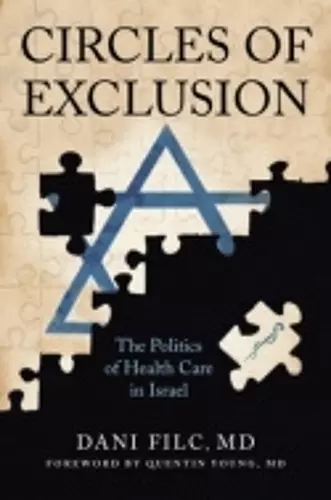Circles of Exclusion
The Politics of Health Care in Israel
Format:Hardback
Publisher:Cornell University Press
Published:15th Jun '09
Currently unavailable, and unfortunately no date known when it will be back

In its early years, Israel's dominant ideology led to public provision of health care for all Jewish citizens-regardless of their age, income, or ability to pay. However, the system has shifted in recent decades, becoming increasingly privatized and market-based. In a familiar paradox, the wealthy, the young, and the healthy have relatively easy access to health care, and the poor, the old, and the very sick confront increasing obstacles to medical treatment.
In Circles of Exclusion, Dani Filc, both a physician and a human rights activist, forcefully argues that in present-day Israel, equal access to health care is constantly and systematically thwarted by a regime that does not extend an equal level of commitment to the well-being of all residents of Israel, whether Jewish, Israeli Palestinians, migrant workers, or Palestinians in the Occupied Territories.
Filc explores how Israel's adoption of a neoliberal model has pushed the system in a direction that gives priority to the strongest and richest individuals and groups over the needs of society as a whole, and to profit and competition over care. Filc pays special attention to the repercussions of policies that define citizenship in a way that has serious consequences for the health of groups of Palestinians who are Israeli citizens-particularly the Bedouins in the unrecognized villages-and to the ways in which this structure of citizenship affects the health of migrant workers.
The health care situation is even more dire in the Occupied Territories, where the Occupation, especially in the last two decades, has negatively affected access to medical care and the health of Palestinians. Filc concludes his book with a discussion of how human rights, public health, and economic imperatives can be combined to produce a truly equal health care system that provides high-quality services to all Israelis.
"Circles of Exclusion does more than characterize the changing nature of the Israeli health care system and the impact of these changes. By tracing the institutional, political, and ideological processes that influence the health of Israelis, Dani Filc also presents a measured but powerful critique of the choices and actions of the Israeli leadership in recent decades. Filc documents how ideology, law, and politics have pushed both Jewish Israeli citizens and other groups—non-Jewish citizens, migrant workers and refugees, and Palestinians in the Occupied Territories—further from the hope of enjoying what he calls 'the right to health.'"—Sarah S. Willen, Harvard Medical School
"Dani Filc's intimate and perceptive analysis of the Israeli health care system helps us understand Israeli medical care and society and illuminates the mechanisms of belonging and exclusion prevalent in all societies. It pulls aside the curtain that obscures the myriad ways that the organization and structure of health care systems determine who gets served and who does not—who is included or excluded by citizenship, by politics, or by the market. Its insights offer lessons for health care reform in any country, including reforms of American health care."—E. Richard Brown, Director of the UCLA Center for Health Policy Research
"In Circles of Exclusion, Dani Filc presents a critical look at Israel through the prism of the right to health. He takes the reader on a journey through the process of retrenchment in public health services, accompanied by their increasing commodification and privatization, whose outcome is increasing inequity and inequality. Filc achieves depth and incisiveness by turning the spotlight onto those groups that are generally left out of mainstream accounts—minority groups such as the Bedouins, migrant workers, and the Palestinians in the Palestinian territories, for whose health Israel has been responsible since occupying them in 1967. In his triple role as a physician working in the system, a social activist serving as chairperson of Physicians for Human Rights—Israel, and as a scholar of social policy, Filc presents a fascinating analysis of the changes in the milieu of publicly delivered health services and their effect on low-income Israelis as well as on non-Israelis under Israel's control."—Shlomo Swirski, Academic Director, The Adva Center
"This moving account of the descent of the Israeli health system is a paradigmatic tale of idealistic goals that have gone awry. Dani Filc's critical perspective on a system that has incorporated into its very structure the racism and exclusionary policies of the broader culture holds a fearsome warning not only to Israelis but also to all of us who see access to health care, if not a healthful environment, as a fundamental human right. This book speaks to all human beings who hope for a better world."—David Rosner, Ronald H. Lauterstein Professor of Sociomedical Sciences and History, Mailman School of Public Health, Columbia University
"Circles of Exclusion is a brilliant critique of a society rooted in egalitarian notions of social welfare and communal responsibility that has floundered on the pervasive global market forces of American-style medicine. Dani Filc meticulously documents this slow transformation and also focuses on the pitfalls for a nation where social benefits are tightly linked to the exclusivity of Israeli citizenship. Exploring the health implications for Israeli Palestinians, Bedouins, migrant workers, and Palestinians living in the Occupied Territories, Filc reveals the devastating social, political and economic consequences of second class citizenship, racism, and a prolonged occupation. Ultimately, he frames the analysis in its most universalist terms such that this book becomes a lesson for all of us struggling for universal health care, social justice for the least empowered in our own societies, and an end to destructive militarism and aggression."—Alice Rothchild, MD, author of Broken Promises, Broken Dreams: Stories of Jewish and Palestinian Trauma and Resilience
ISBN: 9780801447952
Dimensions: 229mm x 152mm x 22mm
Weight: 907g
208 pages